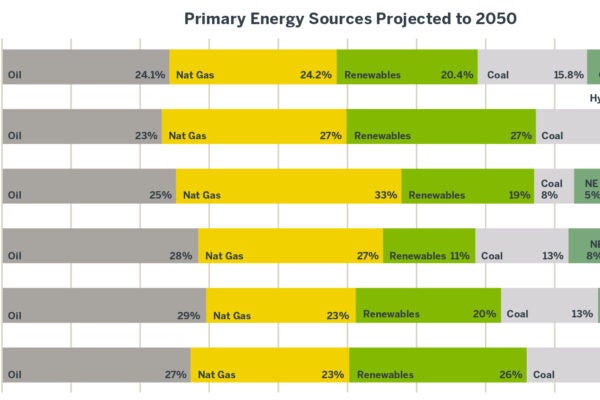Rule of Law Protects National Economies
When employers and the courts consistently keep promises, workers keep the economy on an even keel
Based on the research of William Fuchs

In good economic times, workers trust their employer will pay them. But when an economic shock such as a recession or global pandemic hits, employees aren’t always so sure, especially in countries without a fair and accessible legal process.
That lack of trust has larger economic implications.
In a recent study, Texas McCombs Professor of Finance William Fuchs, along with Martin Dumav of the Universidad Carlos III de Madrid and Jangwoo Lee of Chinese University of Hong Kong, developed an economic model that suggests countries with better rule of law — where courts more easily enforce contracts — experience overall less economic volatility. The opposite is also true. Countries that don’t adhere as well to the rule of law end up with an economy that fluctuates sharply and more often.
“In countries where the rule of law is worse, if I’m an employer, I have more incentive to default on my promises to you when a bad shock hits,” Fuchs says, since there’s no avenue for employees to seek help. In that environment, morale suffers.
“You work less, become less productive, and that amplifies the shock to the economy.” — William Fuchs
Bigger Shocks
To carry out their analysis, the researchers used game theory — the study of how people make strategic decisions — to create a model in which two entities, for example, a boss and an employee, interact over time.
The model features two main building blocks. The first is the concept that businesses are hit by shocks that make them more or less profitable. The second is that contracts aren’t perfectly enforceable, depending on the legal environment.
This lack of contract enforcement can tempt a person to renege on a promise. When a boss reneges, however, there’s a cost. The business relationship is damaged.
Fuchs and his colleagues compared two theoretical economic environments, one with good rule of law, or contract enforcement, and the other marked by poor enforcement. Then they studied the effects of economy-wide and company-specific shocks.
Their analysis showed that when contract enforcement is poor, employee morale suffers, ultimately sparking more economic volatility and greater differences in productivity across companies.
“In bad times, employees don’t see promises as credible.” — William Fuchs
The researchers then compared their theoretical analysis with real-world data. They found that countries with worse rule of law as measured by the World Bank have greater volatility in their growth rates and in the economy overall.
This is case for countries such as China, India, and Russia, which rely more on relational contracts based mostly on trust between two parties. Countries with better rule of law, however, such as the U.S., the U.K., and Australia, see overall less economic volatility.
“In those countries, you don’t need to trust me. You trust the courts,” says Fuchs.
The researchers found that a 1-point decrease (in a scale of 1–5) in the rule of law measure is associated with a reduction in aggregate volatility by 1.2 percentage points. This represents a 35% decrease, since the average level of aggregate volatility is about 3% in the sample.
The second finding suggests India and China could potentially decrease the ratio of productivities of the most productive to least productive companies by about 60% if they could improve the quality of their legal systems to that of the United States.
Finally, the researchers also find a negative relationship between the rule of law measure and wage inequality. All three findings are consistent with their first theorem: Countries with poor contractual environments experience greater aggregate volatility, productivity dispersion, and wage inequality.
In other words, in countries with a weaker legal system, workers in less productive businesses are quicker to stop putting in effort during rocky economic times. If India and China were to strengthen their legal systems, the productivity gap between the countries’ top and bottom companies could shrink.
Building Trust
The findings have implications not only for the employer-employee relationship, but also for relationships between two businesses, and for governments across the globe.
“The economic cycle could be smoother if you had better rule of law.” — William Fuchs
For employers, the model confirms that in difficult economic times, it’s tough to motivate your workers, and companies risk a hefty drop in productivity. But employee trust mitigates that drop. Building trust is even more important for businesses in countries where the rule of law is weak and relational contracts are the norm, Fuchs adds.
To hedge, organizations can work on building trust well before a major shock hits. Companies can establish a reputation for honoring their commitments and clearly explain any decisions employees might see as a departure from what was originally promised. Empowering employees to challenge broken promises can also help companies to gain credibility.
“Whatever businesses can do to build trust and make a commitment to enforce promises, that’s a very valuable thing,” says Fuchs.
“Self-Enforcing Contracts with Persistence” is forthcoming, online in advance in the Journal of Monetary Economics.
Story by Deborah Lynn Blumberg
About this Post
Share:


